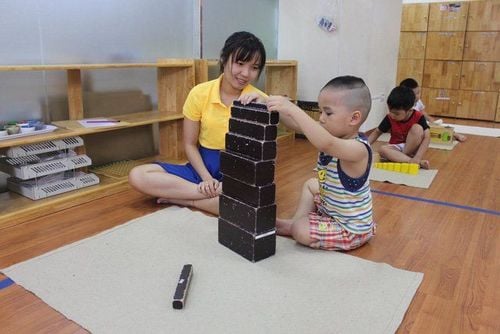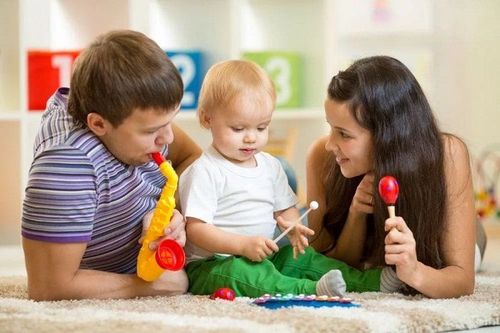This is an automatically translated article.
Speaking is one of the important skills in everyone's life, especially with children. To have good speaking skills requires a long process of learning and practice, this process should be started in children as early as possible.1. What is called speaking skill?
Speaking is an activity that makes a sound, that sound is used to converse, express one's thoughts and feelings. Speaking is a way for a person to convey information to one or more other people. It is often not easy for a child to learn to speak, but it is much more difficult for a child to learn the right speech skills.
Speaking skill is the skill of a person using words to convey information persuasively, so that all listeners will pay attention to listen and properly understand what the speaker is saying.
With the same content, someone with good speaking skills can capture people's attention. But the same content, presented by someone who does not have good speaking skills, people will not pay attention to listen and no information will be absorbed by them.
To achieve good speaking skills, people need to study and practice for a long time. The process of learning speaking skills is started as early as possible, preferably from a young age, when children learn to speak need to be guided in speaking skills.

Nói là cách để một người truyền tải thông tin đến với một hoặc nhiều người khác
2. Fun activities promote children's speaking skills
Promoting children's speaking skills means not only listening to what they have to say, but also engaging in real conversations with children such as: asking questions, making comments, continuing to chat and giving children plenty opportunity to speak my mind.
Here are some games and activities you can use to boost your child's speaking skills and help them learn to speak quickly. Because children learn in different ways, games are organized according to how children learn and you can apply multiple learning styles to the same child.
2.1. Teach your child to be auditory Talk to your child whenever you are together: tell your child an interesting story you have read in the newspaper. Or describe a conversation you had at work with a colleague. When you go shopping with your child, describe what you are buying to them. Get in the habit of retelling your daily routines. For example, if you're washing clothes, you could say, "Separate colored clothes from white ones, then pour in the detergent, put the clothes in, select the wash cycle... "
Your child may not be paying attention, but he or she is taking in your vocabulary and sentence structure without you even realizing it. Don't be surprised if you hear your child repeat something you've said when he talks to others.
Ask open-ended questions: if you ask your child a broad question like "What did you do at the park?" You'll get a much more detailed answer than if you asked a yes or no question like "Did you have fun at the park?". If your child is slow to answer, please be more specific about the question so that your child can understand the meaning of the sentence. Record your child singing a song or telling a story: Children will love hearing their own voice and will be surprised and captivated by the way they speak to others. Keep those recordings, and years from now you'll be happy to hear the voices of children this age again. Review a favorite old story: take one of your child's favorite books out and read it again, stopping at key points to provide follow-up content. Or read the story and deliberately change key details to see if the child corrects your "mistakes".

Cha mẹ hãy dành nhiều thời gian để thường xuyên nói chuyện với trẻ
Take a video of your child reading a book or telling a story: to make this more interesting Also, have the child dress up as a character and act out a scene from the story. Play back the video and watch it with your child, asking them to talk about their performance and praise their speech. You should not attach importance to the issue of correct or incorrect pronunciation. The idea is for the child to feel comfortable speaking in front of others, not to prepare the child for a public office. Ask children to describe a performance: children love to talk about things they know and enjoy. One of the easiest ways to start a conversation is to ask your child what's going on on her favorite TV show. There are many programs for children that are designed to involve parents. This activity not only builds speaking skills but also encourages children to think of themselves as real readers even if they can't recognize a word. 2.3. For children who love nature Children who love and have a passion for nature is a great thing that parents should create conditions for their children to develop their own interests.
Go for a walk in nature: you should bring a box or jar so that the child can collect treasures such as feathers, unusual stones, colorful leaves. When you get home, ask your child to describe each object they collect to the whole family: color, shape, size, function, and where they found them. Or let your child start a nature collection. Family Storytime: you can start making up your own "Once upon a time, there was a little dragon that lived in a cave on a big hill". Then another person continues the story and so on, all the members will create a very interesting story. Let your child chime whenever he wants, and if he can't come up with the whole story on his own, prompt him with questions: What color is the dragon? Does that dragon have siblings? Write down or record what each person says. You can also ask your child to draw pictures to accompany the story and use them to create a book. Periodically, you can pull out the book and let the child retell the story to you. The development of each child is different, there are children who can talk as early as 1 year old, but there are also children who are slow to speak even after 2 years old. Therefore, parents need to identify the problem to make a suitable parenting plan.
If parents are worried about their child's language development or their child shows signs of a delay in speech, talk to the doctor for more specific advice on the condition and solutions.
Vinmec International General Hospital has the function of examining, consulting and outpatient treatment of psychological and mental health problems. With modern equipment, and a team of qualified doctors, we will bring customers the best service experience and improve health.
Please dial HOTLINE for more information or register for an appointment HERE. Download MyVinmec app to make appointments faster and to manage your bookings easily.
Reference source: babycenter.com













